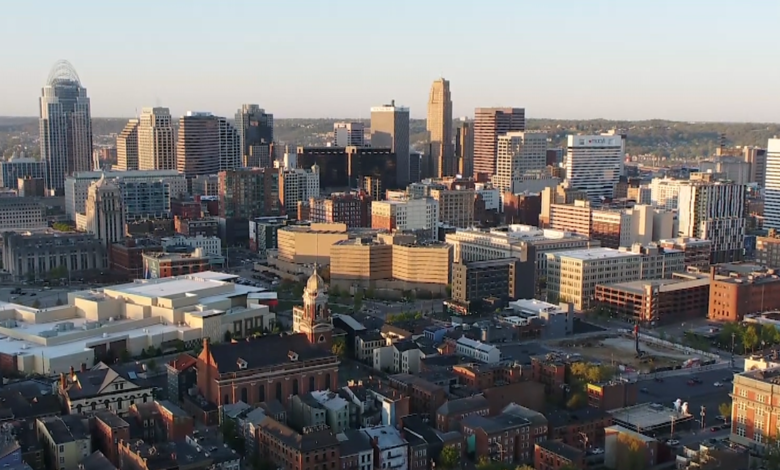

The financial impact of the pandemic cannot be understated for businesses, families and city governments.The city of Cincinnati has lost revenue in a list of areas due to the pandemic. Some revenue streams will continue to be impacted for years.The city lost millions of dollars in parking meter and parking enforcement revenue. In a memo earlier this month, City Manager Paula Boggs Muething estimated revenue from off-street parking will come in almost $2,083,489 below budget and that parking meter and enforcement revenue will come in $2,050,124 under.According to data WLWT obtained from the city, the city gave out 110,732 parking citations in 2018, 100,056 parking citations in 2019 and just 57,387 parking citations in 2020."It's not unexpected that you would see a big drop in parking meters. It will rebound when people feel safe to go out again," said Mayor John Cranley in an interview with WLWT. "Parking revenues are down because people are working remotely. They're not going out to shop as much in order to be safe under the pandemic. I'm more worried about the small businesses and retail establishments who are suffering because of that."This is the last year of Cranley's mayoral term. The city is anticipating an $18.7 million deficit for this fiscal year, according to a memo by the city manager. That includes parking-related revenue, $4.7 million due to canceled events at the Duke Energy Center, $5.3 million from the transient occupancy tax due to decline in lodging, $1.9 million from canceled events at city parks and $2 million from city recreation centers, to name a few of the biggest losses. Next year's budget has to be balanced by June 30."It's a juggling act that we face each year, " said Councilman David Mann. "It's particularly challenging when there's so many uncertainties and we have a pandemic."Mann also chairs the budget and finance committee. He told WLWT the biggest priorities in the budget are covering the deficit and funding the rainy day fund. Help is coming from the federal government via the American Rescue Plan. Cincinnati is slated to receive $290 million. Chris Seelbach, vice chair of the budget and finance committee said council still has a lot of questions surrounding how the federal government will allow cities to spend the money. "The answer is we don't know. The treasury department has not given any guidelines on where the money can be used," he said. "We do have a budget deficit this year that I believe we're going to use some of the money to close. We won't have to cut services and jobs this year, so that's good news," Seelbach said. "Our budget deficit is a direct response of COVID. This money is to help the results of COVID, and so it's expected that it will be able to be used."Mayor Cranley has held a series of announcements about how he believes some of the $290 million should be used, including investments in the arts, parks, neighborhoods and minority-owned businesses. The leaders of the budget and finance committee do not plan to vote on any of the mayor's ordinances for a few weeks, as they await guidance from the U.S. Treasury Department, which is expected in May. "The mayor has been announcing these press conferences as if the money has already been allocated," Seelbach said. "Only council can do that, and we have not allocated a single dollar." City council will hold several additional public hearings for community members to weigh in on how they want the money allocated. Public comment will continue to be available via Zoom, and as of this week, people are now allowed to testify in-person in council chambers.Once life returns to "normal," it will still take time for behaviors to return to pre-pandemic levels. There is also a big concern surrounding remote work and how many people will not return to the office."It's unclear if their home is not in the city of Cincinnati whether they still have to pay city of Cincinnati income taxes," Seelbach said. "If they don't, we could lose 25% of our entire budget, which would affect everything from police to fire to sanitation. Everything would be affected."
The financial impact of the pandemic cannot be understated for businesses, families and city governments.
The city of Cincinnati has lost revenue in a list of areas due to the pandemic. Some revenue streams will continue to be impacted for years.
The city lost millions of dollars in parking meter and parking enforcement revenue.
In a memo earlier this month, City Manager Paula Boggs Muething estimated revenue from off-street parking will come in almost $2,083,489 below budget and that parking meter and enforcement revenue will come in $2,050,124 under.
According to data WLWT obtained from the city, the city gave out 110,732 parking citations in 2018, 100,056 parking citations in 2019 and just 57,387 parking citations in 2020.
"It's not unexpected that you would see a big drop in parking meters. It will rebound when people feel safe to go out again," said Mayor John Cranley in an interview with WLWT. "Parking revenues are down because people are working remotely. They're not going out to shop as much in order to be safe under the pandemic. I'm more worried about the small businesses and retail establishments who are suffering because of that."
This is the last year of Cranley's mayoral term.
The city is anticipating an $18.7 million deficit for this fiscal year, according to a memo by the city manager. That includes parking-related revenue, $4.7 million due to canceled events at the Duke Energy Center, $5.3 million from the transient occupancy tax due to decline in lodging, $1.9 million from canceled events at city parks and $2 million from city recreation centers, to name a few of the biggest losses.
Next year's budget has to be balanced by June 30.
"It's a juggling act that we face each year, " said Councilman David Mann. "It's particularly challenging when there's so many uncertainties and we have a pandemic."
Mann also chairs the budget and finance committee. He told WLWT the biggest priorities in the budget are covering the deficit and funding the rainy day fund.
Help is coming from the federal government via the American Rescue Plan. Cincinnati is slated to receive $290 million.
Chris Seelbach, vice chair of the budget and finance committee said council still has a lot of questions surrounding how the federal government will allow cities to spend the money.
"The answer is we don't know. The treasury department has not given any guidelines on where the money can be used," he said.
"We do have a budget deficit this year that I believe we're going to use some of the money to close. We won't have to cut services and jobs this year, so that's good news," Seelbach said. "Our budget deficit is a direct response of COVID. This money is to help the results of COVID, and so it's expected that it will be able to be used."
Mayor Cranley has held a series of announcements about how he believes some of the $290 million should be used, including investments in the arts, parks, neighborhoods and minority-owned businesses.
The leaders of the budget and finance committee do not plan to vote on any of the mayor's ordinances for a few weeks, as they await guidance from the U.S. Treasury Department, which is expected in May.
"The mayor has been announcing these press conferences as if the money has already been allocated," Seelbach said. "Only council can do that, and we have not allocated a single dollar."
City council will hold several additional public hearings for community members to weigh in on how they want the money allocated. Public comment will continue to be available via Zoom, and as of this week, people are now allowed to testify in-person in council chambers.
Once life returns to "normal," it will still take time for behaviors to return to pre-pandemic levels. There is also a big concern surrounding remote work and how many people will not return to the office.
"It's unclear if their home is not in the city of Cincinnati whether they still have to pay city of Cincinnati income taxes," Seelbach said. "If they don't, we could lose 25% of our entire budget, which would affect everything from police to fire to sanitation. Everything would be affected."
Source link









